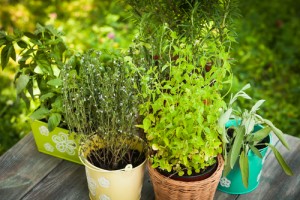By Rebecca Maxwell
Having your own garden can be an extremely rewarding yet intimidating experience for first-timers. Beginners often have many questions about what to grow, when to plant, how often to water, and so on. If you are wondering where to begin, you just might consider planting and growing herbs.
Herbs have many advantages over traditional vegetables for many reasons. Most importantly, they are probably the easiest to grow because they require little attention, average soils, and very little extra watering after the plants are established. Moreover, it is less expensive than buying herbs at the grocery store. The herbs in stores are frequently at least six months old and have already lost a good amount of flavor.
In addition, there are a wide variety of products to be made from herbs including herbal teas, oils, butters, and vinegars. Herbs can easily be preserved by drying or freezing them.
Getting Started with Herbs
Herb seeds are normally tiny so they do not need to be buried. Simply sprinkle the seeds on the surface of the soil and tamp them down. There is also the option of starting your basic herbs by finding the nearest garden center and purchasing transplants. If you already have existing plants of chives, oregano, and tarragon, you can easily divide them and take a portion for your garden. Make sure you keep the roots moist, however.
In terms of where to plant herbs, there are many places to choose from. You can mix them into a flower bed, keep them in a corner of a vegetable garden or even in a hanging basket or window box. Keep in mind that you are most likely to use them, however, when placed near the kitchen. It is also important to know that herbs take a while to germinate, typically two to three weeks.
Taking Care of Herbs
Most herbs need plenty of sunshine (5-8 hours) every day. There are exceptions, though. For example, mint grows the best in damp, shady areas. Of course, the particular herbs you choose to grow will dictate the best care practices. Generally speaking, it is important to pick herbs at the right time which is just as they begin to flower. Herbs are ideally picked before being allowed to set seeds and are pruned as harvested.
Preserving Herbs
After herbs are picked, they can be dried and preserved for future use. The process of drying begins by placing them either outside in the shade or in a dehydrator. Herbs should be never be dried in full sunshine and should be washed if dirty. The more time-honored tradition dries the leaves by hanging them from a rack in a shaded area. After dried, the leaves can be removed from the stalks and then stored in tightly sealed containers.
Herbs can also be preserved by freezing. Simply wash the leaves and spread them out until dry and wilted. Place them in jars and freeze them. You can then use the herbs for all kinds of cooking and for making oils, butters, and teas.

